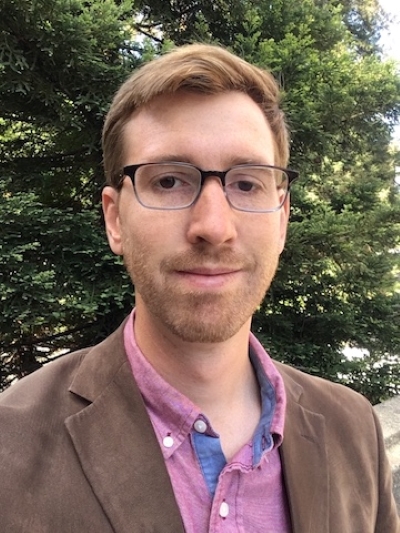Joe Clark is an assistant professor of history at the University of Kentucky. He lives in Lexington, Kentucky, and has been a member since 2012.

Alma maters: BA, Boston University, 2010; PhD, Johns Hopkins, 2016
Fields of interest: Latin America, Caribbean, Atlantic world, early modern, African diaspora, environmental
What do you like the most about where you live and work?
We have an incredible community of brilliant and supportive colleagues at UK, especially in the history department.
What projects are you currently working on?
I have just started a new book project called Witchcraft and Contraband in the Early Modern Caribbean. The book examines the intersection of witchcraft cases tried by the Inquisitions of Mexico and Cartagena with the simultaneous effort to suppress contraband trade in Caribbean port cities between 1610 and 1640. The project began with the observation that the people accused of witchcraft tended to be single, economically independent women who worked in the service economies of major ports—where religious officials were also concerned about the (illicit) commercial power of northern European Protestants and Portuguese merchants who they suspected of being Jewish. The chapter structure is only just taking shape, but I hope the project will allow me to examine the economic and political agency of Caribbean women; the religious aspects of contraband in the Protestant and Catholic Reformations; and informal environmental and material networks in the early modern Atlantic.
Have your interests evolved since graduation? If so, how?
I am increasingly interested in climate, environment, and energy history in both research and teaching. Like many people, I have long been alarmed about the climate crisis, but I have also been unsure how that concern should inform my work as an historian. As an early modernist, I have a kind of ingrained hesitancy about letting contemporary issues structure my scholarship and I tend to shy away from continuity-driven narratives. But I have embraced Bill Cronon’s advice to look to history for parables about human-environmental interactions rather than for strict continuity. I have also tried to emphasize, in teaching especially, how the historian’s toolkit—our ability to contextualize and synthesize large amounts of discrete, abstract information into a thesis-driven narrative—can be useful as we navigate the social and political terrain of climate change.
What’s the most fascinating thing you’ve ever found at the archives or while doing research?
I will pick a story I stumbled on once that I have never found anything to do with. It comes from a memorial written by the Spanish Governor of Havana, Gaspar Ruiz de Pereda, in 1614. Ruiz de Pereda describes the arrival of a monk of the Orthodox Church named Basilio, who claims to be the primate of Macedonia. According to Basilio, he had traveled from Constantinople to the French court in Paris, then to London, the Canaries, Guinea, Hispaniola, and Puerto Rico before arriving in Havana on his way to Mexico—all in order to raise money that, he claimed, he had to pay to the Ottoman Caliphate to free his church from Turkish oppression. Because Basilio had no written authorizations from Rome or Seville to travel in the Americas, he was sent back to Spain with orders that he never be allowed to return to the Americas. My instinct is that Basilio was a charlatan, but Ruiz de Pereda himself was not sure and gave him a lot of deference.
Is there an article, book, movie, blog etc. that you could recommend to fellow AHA members?
My tastes in books and movies are decidedly nonacademic, but one novel I love that touches on my area is The Moor's Account by Laila Lalami. I also recommend the blog Carbon Brief and the podcast The War on Cars.
What do you value most about the history discipline?
Nothing is as humbling as walking the library stacks and realizing just how much there is to know that we can never know. I think you can get that feeling from a lot of disciplines, but what makes history different for me is, when you think of all the books, manuscripts, art, media, and material that you will never have time to read, see, hear, or hold you know they are not just objects to be studied, but artefacts—something made by another human being, who had their own thoughts, feelings, and motivations. I guess what I am trying to say is, what I value about history is its capacity for empathy. Not just that it helps you realize how big the world is, but it asks you to go a step further and try to see beyond your own narrow experience and consider the many ways other people have seen the world.
Why is membership in the AHA important to you?
We always need advocacy.
AHA members are involved in all fields of history, with wide-ranging specializations, interests, and areas of employment. To recognize our talented and eclectic membership, Perspectives Daily features a regular AHA Member Spotlight series.
Tags: Perspectives Daily Member Spotlight Global History Latin America Environmental History

This work is licensed under a Creative Commons Attribution-NonCommercial-NoDerivatives 4.0 International License. Attribution must provide author name, article title, Perspectives on History, date of publication, and a link to this page. This license applies only to the article, not to text or images used here by permission.
The American Historical Association welcomes comments in the discussion area below, at AHA Communities, and in letters to the editor. Please read our commenting and letters policy before submitting.
Comment
Please read our commenting and letters policy before submitting.







